Profile: Tom Meijer, exchange student
September 18, 2010 by Paul Fleischanderl · 2 Comments
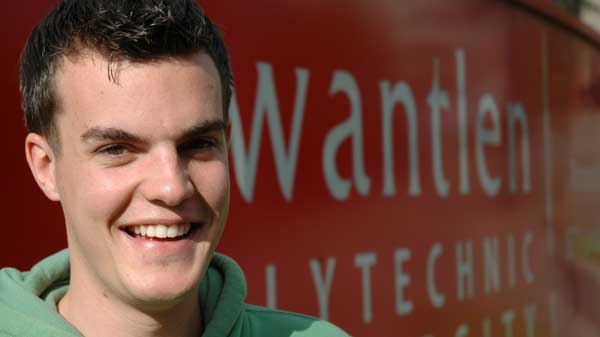
Tom Meijer, 21, is an exchange student from the Netherlands. (Photo by Paul Fleischanderl)
It was his first week of classes at Kwantlen’s Richmond Campus, but he is no freshman. Tom Meijer, 21, is an exchange student from Rotterdam, Netherlands and in his third year of International Business studies.
Meijer is one of Kwantlen’s 34 exchange students in the fall 2010 semester. After this semester, he will be a student in the Netherlands again. His five classes here fit with his program at home, and the credits are transferable. He came to Vancouver because he wanted to do his exchange in an English-speaking country.
“I also think the culture here suits me. It’s quite liberal and open-minded — like me,” he said./p>
Meijer enjoyed his first days at Kwantlen. “I really like the small classes with around 20 students. This way it’s easy to engage with the instructor’s material.”
Class work and the style of teaching are quite similar to his school at home, Meijer said, although one difference is that the instructors here put more effort in engaging the students than they do in Rotterdam.
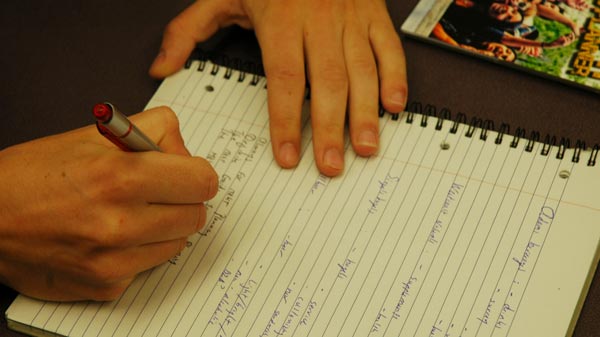
Taking notes in his business class. (Photo by Paul Fleischanderl)
Being thousands of kilometres away from home doesn’t seem to bother him. Going abroad wasn’t a big decision.
“I chose my studies consciously and I knew that going abroad is part of my program. That’s what I wanted and I would be very disappointed if I would be staying at home now.”
Meijer said that leaving friends and family has been surprisingly easy. A few years back, he saw his brother gaining international experience and enjoying it. So he knew what was coming to him and — more important — he knew what the experience is worth.
At first, one needs courage to leave the comfort-zone of home, Meijer thinks. “If you do so, you try new things and you meet new people. You challenge yourself and become more.”
The new culture was at first awkward but he settled in quite fast and got used to it, he said.
His first day was a difficult one. Back then, he had to find a room and the place where he first stayed was still under construction. He couldn’t rest enough to get rid of his jetlag. So he went for a walk.
He discovered Vancouver bit by bit and he would recommend to everyone who is new to a city to explore it at first by foot at one’s own pace.
Especially at the beginning of an exchange, student’s social contacts to friends and family at home can help. “Writing e-mails and posting on Facebook is daily stuff,” he said. As well, once a week Meijer talks to his parents on Skype.
Although he will be away from home for five months, he’s not afraid to lose his connections to people at home. “My friends know I miss them, and I know they miss me. A couple of months won’t change anything.”
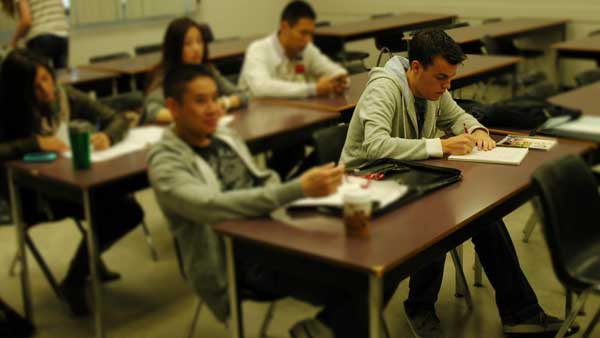
Meijer likes the small size of classes at Kwantlen. (Photo by Paul Fleischanderl)
In most of his classes, Meijer is the only exchange student, which means a lot of new faces and acquaintances.
“People here are interested in who I am. But it’s mostly politeness and small talk. Everyone has their own life and their social circles,” he said.
Meijer wants to get to know the people here, but he thinks they aren’t easy to approach. He knows that it how acquaintances will perceive him depends on his attitude, and that he has to make the first step.
Every semester thousands of students like Meijer all around the world experience life, joy and adjusting abroad. But Europeans seem more likely to go abroad than Canadians. Numbers from Internationalization in education in the Netherlands from 2008/2009 show more than 40,000 Dutch students abroad. Data from the Association of University and Colleges in Canada’s from 2007 shows that there are roughly 18,000 Canadian students abroad in 2006/2007. (These numbers combine exchange and international students.)
The price of getting in shape for back to school
September 18, 2010 by Jocelyn Gollner · Leave a Comment
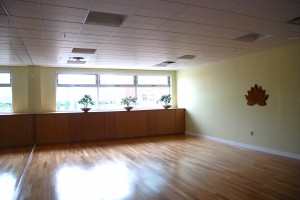
The Kwantlen yoga studio at the Richmond campus is one of Kwantlen's several recreational facilities. (Jocelyn Gollner photo)
After a summer full of barbecues and beer, it’s time for students to get back in shape.
But the question is where to go?
We asked 10 students at the Kwantlen Surrey campus where they most frequently went to for exercise, and if they used Kwantlen’s exercise facilities. (Kwantlen has a yoga studio at the Richmond campus and a gymnasium and fitness centre at the Surrey campus.)
Out of the 10 people questioned, only one uses Kwantlen’s facilities.
“If [Kwantlen’s recreational facilities] were included in the student fees, then I’d definitely go, but if it’s not then I’ll figure out some other way that’s much cheaper,” Lindsey Neill, a general arts student at Kwantlen, said.
Kwantlen charges students (taxes included) $5.25 for drop-in sessions at the gym, $15.96 for a month pass, $42.56 for a three-month pass, or $127.68 for an annual pass.
In comparison, student rates at the Walnut Grove Community Centre in Langley (taxes not included) are $3.12 for drop-in, $34.43 for a one-month pass and $93.90 for a three-month pass. There’s no student discount for the centre’s $369.75 one-year pass.
Manjot Thyar, a business management student at Kwantlen, doesn’t think students should pay to use the gym at Kwantlen because “we are already paying for tuition and we don’t have a lot of money. We take out student loans and we have to work and whatnot.”
Despite the expenses that kinds of exercise demand, some students are still willing to pay. David Lee, a student taking ESL courses at Kwantlen, is involved in Kendo, which is a martial art.
“It’s pretty expensive, though,” Lee said. “It’s $300 a month.”
Sociology instructor talks about the future of black history
February 16, 2010 by Jacob Zinn · Leave a Comment
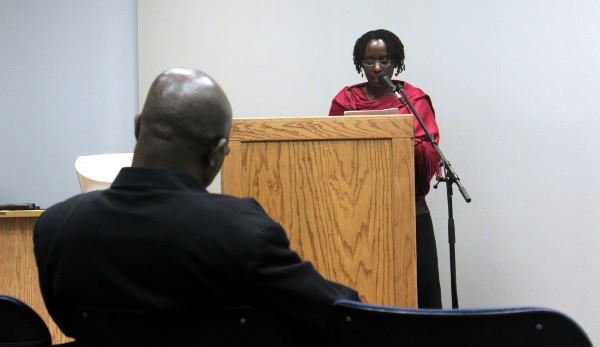
Juliane Bitek reads several of her poems at Kwantlen's Black History Month Confab. (Jacob Zinn photo)
On Feb. 8, Kwantlen’s sociology department held its annual Black History Month Confab in the conference centre of the Surrey campus.
This year, the department collected donations for Haiti earthquake relief and raised $220, bringing the classes total to over $3,000.
The well-attended event featured four film screenings on African history and performances by spoken word poets Juliane Bitek, Scruffmouth and John Akpata.
Dr. Charles Quist-Adade, a sociology instructor, has led the discussion since he moved to Kwantlen four years ago. This year’s theme, “The Danger of One Story or the Power of Multiple Stories,” is a combination of two ideas in black history.
“The first part of the theme, ‘The Danger of One Story,’ is actually the title of a talk that was given by the Nigerian author named Chimamanda Adichie,” said Quist-Adade. Adichie’s talk notes that the western media gives only a one-sided rendition of the story of African history.
Quist-Adade added the second part of the theme and explained that multiple stories provide knowledge and empowerment.
The purpose of the discussion was to celebrate and reflect on black achievements, challenges and shortcomings. This year’s confab had a good turnout, but Quist-Adade doesn’t feel the current generation has a strong grasp on black history, which makes it all the more important for youth to attend.
Beyond the recognition of Nelson Mandela, Rosa Parks and Martin Luther King, Jr., he feels many aren’t aware of lesser-known, historical black figures.
“The contribution of people of African descent to the global stock of knowledge, to world civilization, has been over the years marginalized, at best,” said Quist-Adade, citing advancements in science, social sciences and engineering. “And ignored at worst.”
He feels the biggest issue within black communities is having a media outlet to broadcast their message of African heritage.
“We don’t have the power, we don’t have the voice. [...] When you have the voice, then you can push your identity.”
With the U.S. presidency of Barack Obama, Quist-Adade considers his election to be “the second American Revolution.” But at the same time, he’s realistic about the changes Obama can make.
“While we’re happy he’s elected, our hopes should not be too high,” he said. “We should temper our optimism with pragmatism and realize that he cannot solve the problems of the people of African descent alone and quickly.”
Spoken Word Poetry
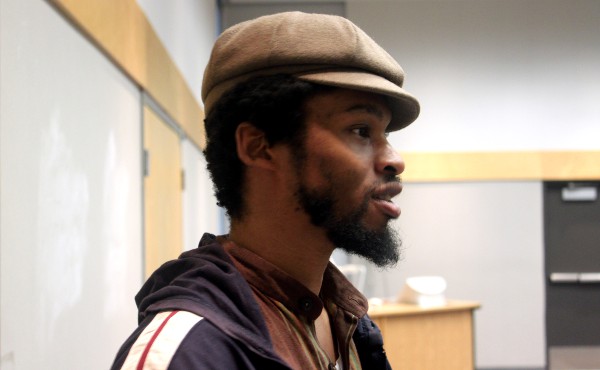
Scruffmouth, whose name is derived from his facial hair, has done spoken word poetry since 2004. (Jacob Zinn photo)
[audio:http://www.kwantlenchronicle.ca/audio/Scruffmouth2.mp3]
“Pan-Africanism is Dead” by Scruffmouth
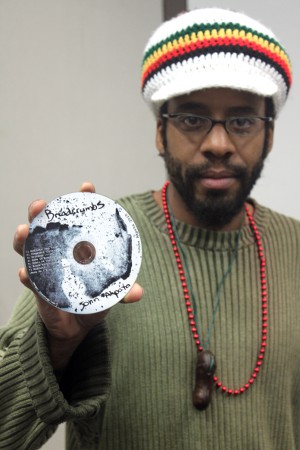
John Akpata is pictured with his spoken word CD titled "Breadcrumbs." He is doing shows in the Lower Mainland and on Vancouver Island throughout Black History Month. (Jacob Zinn photo)
[audio:http://www.kwantlenchronicle.ca/audio/John_Akpata2.mp3]
“To Be or Not to Be” by John Akpata
Students raise big money for Big Brothers
February 16, 2010 by Abby Wiseman · Leave a Comment

A belly dancer entertains the crowd at the Circus of the Night fundraiser for Big Brothers of Greater Vancouver. (Abby Wiseman photo)
Public relations students hosted a big bash for Big Brothers on Feb. 9 at the Circus of the Night fundraiser.
Through ticket sales, donations and a silent auction, the second-year students raised $6,900, exceeding their goal of $6,000.
The idea behind the event was to create an atmosphere where adults could feel like kids again, said student Alicia Bernbaum.
Adding to the circus-vibe was the illusionist Yeeri, two belly dancers and tango dancers and candy apples, popcorn and “circus-tinis” were served.
One of the evening’s highlights was a speech by big brother Steve Lee, who spoke about the positive effect being a big brother has on his life.
Every year, second year PR students host a charity fundraiser as part of their event management course.
Amelia Kennedy is the course instructor and has been a Big Sister for 11 years. She knows how difficult it can be for 24 people to organize an event, and said they did “really well.”
“It’s really great to see all their hard work come together, and pull off a really great event, and raise a lot of money for Big Brothers,” said Kennedy.
Kwantlen students pull together for Haiti
February 3, 2010 by Abby Wiseman · 2 Comments
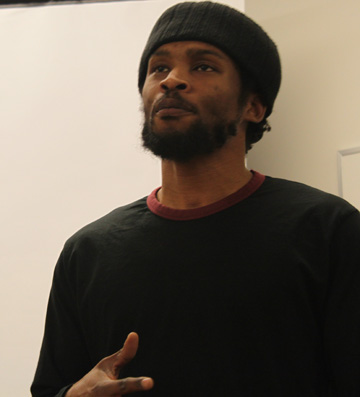
Kevan Cameron was the entertainment at the Haiti fundraiser on Jan. 22. The event was hosted by Charles Quist-Adade's sociology 1125 class. (Abby Wiseman photo)
Kwantlen students are still doing their part to raise money for Haiti.
On Jan. 22, Charles Quist-Adade, his Sociology 1125 class and the Ghanian-Canadian Association of B.C. threw a fundraiser, which raised $2,565 for Doctors Without Borders and the Canadian Red Cross.
(Update: Fund-raising continued after the event and the amount raised has grown to $2,800.)
Quist-Adade was thrilled with the amount of money donated, and said he was expecting to only raise about $500.
“It’s really upsetting to see what’s going on. It’s just scary to see that something can happen out of nowhere,” said Jasman Virdi, a sociology student. “It’s good that everyone is pulling together to help out all around the world.”
The highlight of the event was local poet Kevan Cameron.
Cameron recited three poems about African-American culture, modern society and playing scrabble with his mother.
KSA campus councils have also been raising money after the Richmond KSA challenged Surrey and Langley to a fundraising competition for World Vision.
Altogether the KSA raised $1,132 from students, and will matching $1,077 of it, said Reena Bali, the Richmond campus director
Richmond students donated $928; Surrey students donated $148; and Langley students $55.
Bali said she will be taking the competition further, by challenging the university to match the donation.
Kwantlen’s president David Atkinson sent out a letter encouraging students to do what they can for Haiti, but has yet to announce any donation from the university.
(Note: This article has been edited since publication to include the corrections noted in the accompanying comment.)
Nintendo Wii makes students healthii
February 3, 2010 by Jacob Zinn · 1 Comment
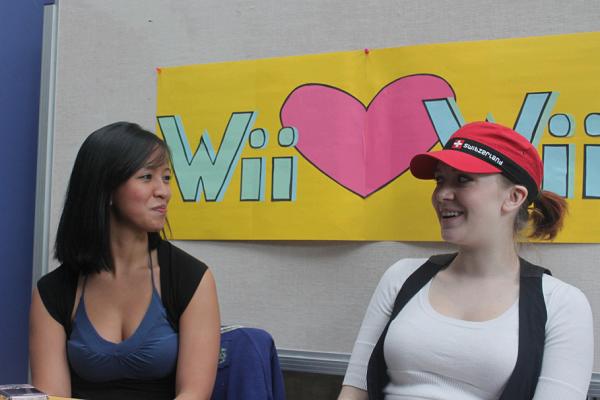
Ivy Mendoza and Heather Poirier ran the sign-up booth for the Wii tournament, which the KSA hopes will get Richmond students involved in recreation. (Jacob Zinn photo)
The Kwantlen Student Association loves Wii.
Last week, students signed up for the KSA-run Nintendo Wii tournament at Kwantlen’s Richmond campus.
The Wiimote-toting tourney, which is scheduled to run through April, will feature selections from the Wii Sports video game, from boxing to bowling.
“Everyone takes turns and they go up against each other and they win prizes,” said Heather Poirier, a KSA volunteer at the Wii Heart Wii booth.
The dates for each competition are tentative. Boxing will likely be in early February, tennis in early March, golf in late March and bowling in April.
Registration for the tournament has ended, but Eddie Lee of the Student Health Improvement Program hopes the games will encourage students to become more physically active and join fitness classes.
Ivy Mendoza, another volunteer, said, “He’s really advocating for intramural sports.”
The school is only offering basketball this semester for intramurals and registration has ended, but other types of recreation such as pilates and yoga are alternative options.
Though Lee isn’t sure if other universities have added the Nintendo Wii to their fitness programs, he hopes to engage students and improve student life. He hopes that making exercise convenient for students will increase participation.
The yoga and pilates classes have steadily increased in attendance since last semester, but spots are still available and drop-ins are welcome. Kickboxing filled up quickly and is unable to accept any more applicants.
For more information on intramural programs, fitness schedules and prices, visit the SHIP website or email Eddie Lee.
KSA seminar teaches do-it-yourself beer-making
January 29, 2010 by Jacob Zinn · 2 Comments
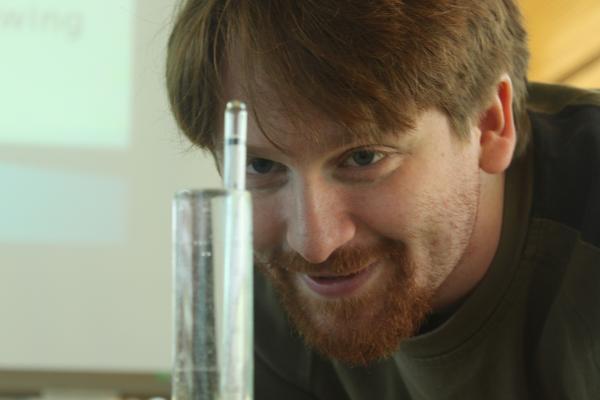
Nathan Griffiths shows how to use a hydrometer to measure alcohol at the Cloverdale campus on Jan. 19. (Jacob Zinn photo)
Who needs a liquor license when students can make their own beer?
On Jan. 19, Nathan Griffiths of the KSA lead a home-brewing seminar at Kwantlen’s Cloverdale campus for about a dozen students, teaching them how to fermented lagers and ales.
“Beer is always popular, definitely an important part of social life,” said Griffiths, who had a copy of Homebrewing for Dummies. “I just wanted to kind of teach them the science and the process and the history, and of course, how to make it yourself for fun and save some money.”
For the KSA, teaching students to make beer is cheaper than getting a liquor license for a special event, which was a factor in making this first of four educational seminars.
Griffiths got into homebrewing after going to a you-brew business and learning the process of brewing batches of beer.
“I find it to be a much more social way to have friends over,” he said. “If they do a batch, I’ll do a batch and we can swap back and forth. That way, you’re not drinking half a keg of one type of beer.”
It’s illegal to distill hard alcohol, but making beer, wine and cider at home is permitted.
Griffiths recommends first-time brewers use a kit, which is often affordable and come with the ingredients needed to make beer: pre-mixed barley, hops, yeast and fine sugar. He stresses that the instruments must be sanitized because any bacteria can ruin a batch.
The process of homebrewing involves boiling sugar and the contents of a kit in water and leaving it in the primary fermenter for a week. Then it is moved into a secondary fermenter for another two to eight weeks (depending on the recipe) to make the beer more flavourful. Another cup of fine sugar is added to create carbonation and the beer is siphoned into bottles for one more week before consumption.
The temperature is also key during fermentation. Ales can be brewed at room temperature, but lagers should be kept at 10 C.
Events such as this are to being held to encourage student life on different campuses. Cloverdale has two more seminars: one on tenant’s rights and another on the B.C. Industry Training Authority for apprenticeships in different fields of work.
Richmond campus licensed event says more than ‘Get drunk’
January 29, 2010 by Kristi Jut · Leave a Comment
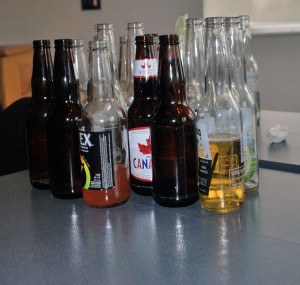
More than a handful of drinks were already consumed by 2 p.m. at Richmond campus' licensing event. (Kristi Jut photo)
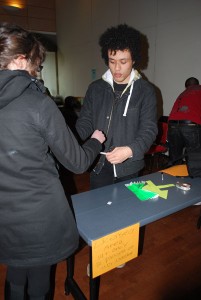
Matthew DiMera, who is running for the Director of Academics seat on the KSA board, monitored the event, giving out wristbands to students of legal drinking age. (Kristi Jut photo)
Reena Bali, the Richmond campus director, thinks that Kwantlen needs a better student life. That’s why she and other KSA members from the Richmond campus decided to put together a “licensed event” on Wednesday, Jan. 27.
The conference rooms at the Richmond campus were designated as the licensed area, where snacks such as chips and dip were provided, and alcohol was sold. Bali said the event, which was held from 1 to 7 p.m., took nearly two months to plan.
“Getting alcohol and food is very simple,” she said. “The longest part is getting the school to approve it, waiting to hear back, and then finding someone to get the liquor license.”
Students who came to the event had to present two pieces of ID to enter the designated licensed area, and were given a wristband to show they were of legal drinking age. There were also flyers that featured all local taxi numbers for students who needed a way home after the event.
Bali said the licensing event is a result of student interest. People repeatedly asked her, while the KSA was giving away free food, when the campus would “sell beer.”
“Richmond will probably be licensed in the long run,” she said. “We should be licensed because we need more of a university atmosphere. Most universities have some kind of licenesd area or a pub area, and Surrey has one… it’s part of the student culture and life that we don’t see here.”
Instead of going back into the KSA’s budget, 100 per cent of proceeds from alcohol sold at the event went to relief efforts in Haiti.
No student clubs at Langley, so Tubbs creates Sandwich Appreciation Club
January 29, 2010 by Kim Ytsma · Leave a Comment
Christopher Tubbs was a first-year university student at Kwantlen Polytechnic University when he discovered a lack of student life.
When he first asked the KSA about student clubs on the Langley campus, he was told there weren’t any. The majority of clubs were located on the Surrey and Richmond campuses and the majority of the clubs focus on academic programs and specific interests.
Tubbs was looking for something different: a way to meet new friends in a social environment. So he began the creation of the Sandwich Appreciation Club.
The club, which states in it constitution that it will “unite sandwich lovers beneath a common banner so that they may be provided with peace, order, and good carbs,” has over 60 members, and according to Tubbs, is still the only club on the Langley Campus.
According to the Kwantlen website, the Sandwich Appreciation Club was created to “appreciate the sandwich in its many forms with its many ingredients, including wraps, to promote public awareness and understanding of sandwich appreciation and to encourage sandwich-orientated discussion, debate, and activity.”
Tubbs said that the club’s title is all in good humor, and that the main objection is to get students together for a good time.
“The Sandwich Appreciation Club is a casual thing and we are more than happy to poke fun at ourselves,” said Tubbs.
While there are no other funnily-named student groups located at Kwantlen, there appears to be a trend of students wanting to created social clubs.
Simon Fraser University has both the Bubble Blowing club, created to “spread happiness around campus,” and the “Beard and M(o)ustache Fellowship,” which claims to “promote understanding of hairy people, and to fight discrimination against bearded men and woman”.
The University of British Columbia has both the “Radical Beer Faction” and the “Peace and Love Club.”
While Tubbs has not yet arranged his club’s first meeting of the year, he said the hopes student club would have all kinds of group-hangouts and activities throughout the year.
Instructor’s fast food free verse gets radio airtime
January 15, 2010 by Jacob Zinn · Leave a Comment
Billeh Nickerson’s three-month stint in fast food some 20 years ago now has him busy until August on a nationwide book tour.
This week, the Creative Writing instructor discussed his new book, McPoems, with Shelagh Rogers on the CBC radio show The Next Chapter. The book is a collection of poetry written about his time in the fast food service industry.
“All the poems are second-person and they situate the reader behind the counter,” said Nickerson, who worked at a well-known fast food restaurant in Langley while he was a Kwantlen student.
“There’s poems about French fries and ice cream cones and people freaking out about finding pickles on their burgers when they didn’t want pickles.”
Though complaining customers are a part of the job, Nickerson chose to focus more in the lighter side of fattening food chains, such as colourful regulars and co-workers having fun.
“I didn’t want pick a necessarily rhetorical stance because that’s happened with Fast Food Nation and Super Size Me,” said Nickerson. “I just wanted to have a focus on images and stories and let the reader make their own decision.”
Here’s a sample from McPoems, titled “Twist Cone.”
Your co-worker sings “Ebony and Ivory” every time she makes a twist cone
“It’s like chocolate and vanilla,” she tells you repeatedly
So often, you begin to hate pianos
almost as much as twist cones,
the people who order them,
and co-workers who sing
Nickerson had fun with the design of the book as well. The front cover is made to look like a Big Mac and the author’s photograph is his employee-of-the-month photo from July 1989, which his parents kept and gave to him a few years ago.
The interview aired on Monday and will be repeated on Saturday, Jan. 16 at 4 p.m. on CBC Radio One, 690 AM.


